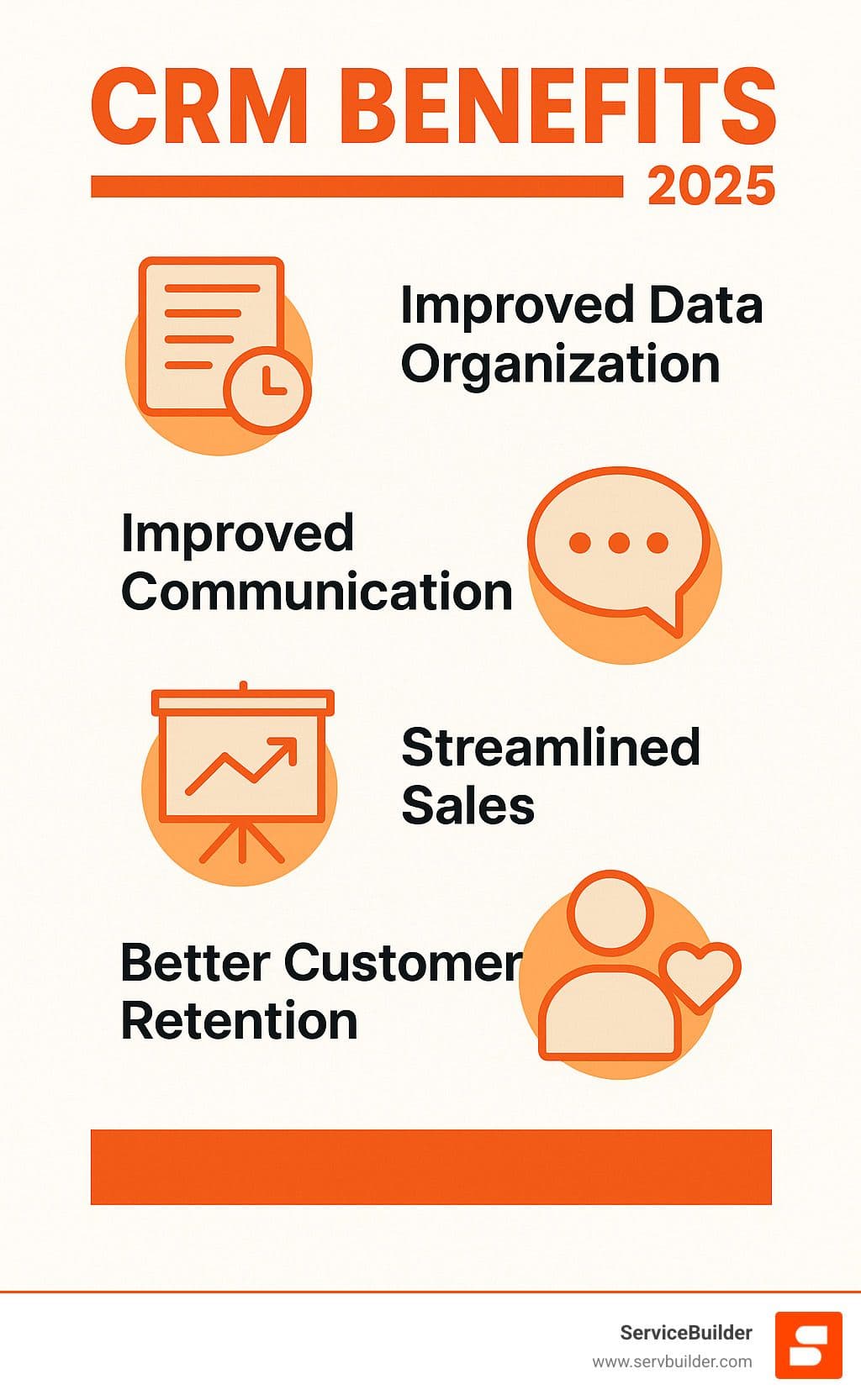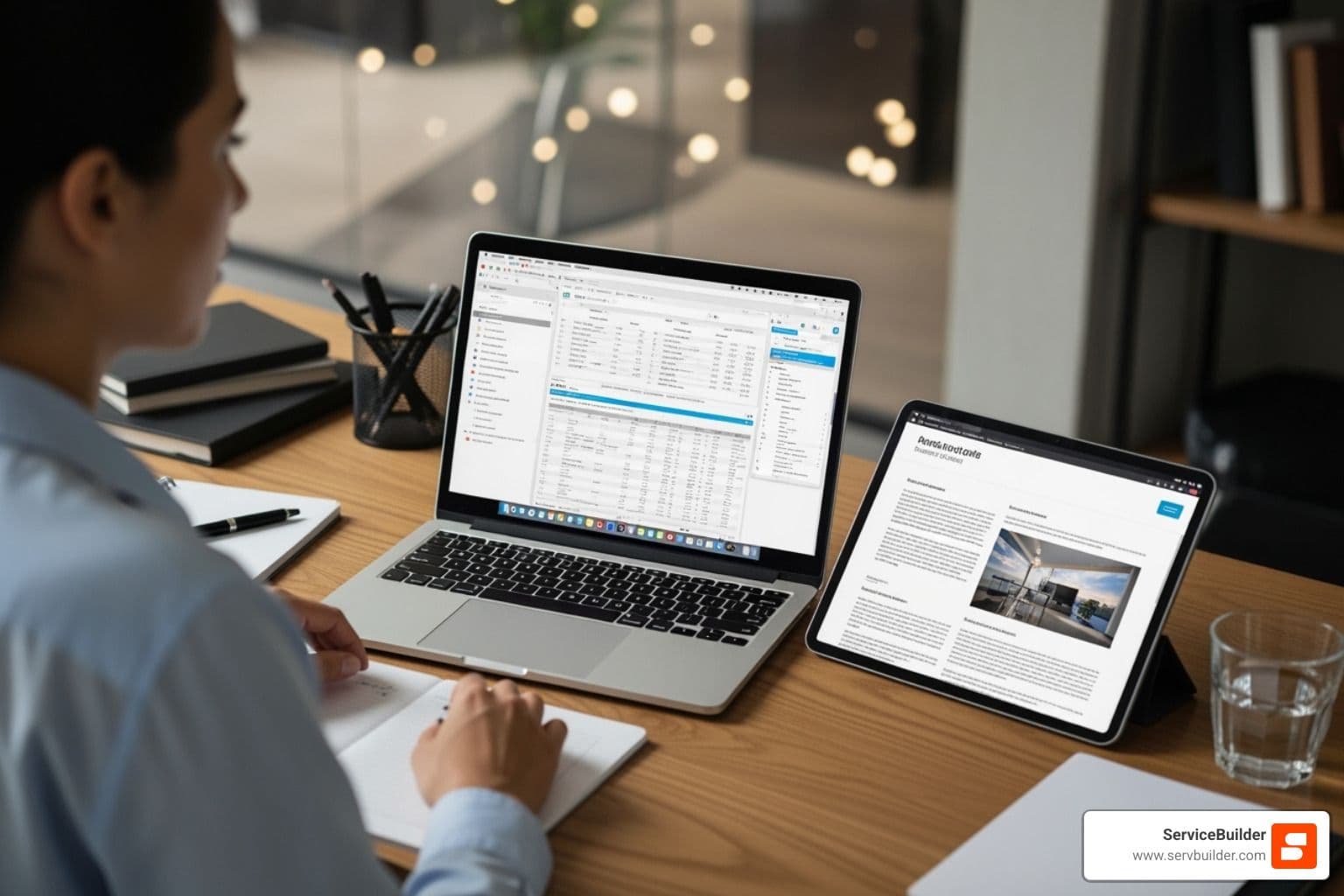CRM Solutions Explained: Picking the Right Tool for Your Team
- Andrew Leger
Why CRM Solutions Are Critical for Growing Service Businesses¶
CRM solutions are software platforms that help businesses manage all customer interactions, track sales opportunities, and organize customer data in one central location. Here's what you need to know:
Top CRM Solution Categories:
All-purpose CRMs: Salesforce, Zoho CRM, HubSpot - comprehensive features for various industries
Small business CRMs: Less Annoying CRM, Pipedrive - simple, affordable, easy to use
Field service CRMs: ServiceBuilder, Jobber, ServiceTitan - built for trades with mobile-first features
Sales-focused CRMs: SugarCRM, Freshsales - pipeline management and deal tracking
Key Features to Look For:
Contact and lead management
Sales pipeline tracking
Mobile accessibility
Automation capabilities
Integration with existing tools
The CRM market is projected to reach $96.39 billion by 2027, yet poor data quality causes significant issues, with 31% of businesses losing at least 20% of annual revenue because of it.
For service businesses, a CRM is vital for coordinating field teams, managing job schedules, and tracking customer history across multiple projects and locations. As Tyler from Less Annoying CRM puts it: "If a software engineer can't set up a CRM, we have a problem." Many traditional CRMs are overly complex for SMBs, slowing them down instead of helping.
I'm Andrew Leger, founder of ServiceBuilder. With over 15 years in enterprise software, I saw how poor CRM solutions crippled service businesses. I created ServiceBuilder as a modern, mobile-first alternative designed specifically for teams in the field.

The Core Components: Key Features to Look for in Top CRM Solutions¶
When evaluating CRM solutions, it's easy to get overwhelmed. The best CRM has the right tools for your specific needs without unnecessary clutter. Here are the core components that separate great CRMs from mediocre ones.

Contact and Lead Management¶
This is your CRM's foundation. The best systems create a centralized database for a 360-degree customer view, consolidating every interaction—calls, emails, service requests, and payment history—in one place. Key features include effective lead capture, lead scoring to prioritize prospects, and lead nurturing. A complete communication history is invaluable, giving you instant access to past conversations.
Salesforce and Zoho CRM excel here, offering robust contact management that scales. For smaller teams, HubSpot provides excellent, user-friendly contact organization. This feature helps you understand your customers and their journey, which is essential for building lasting relationships.
Sales Pipeline and Opportunity Tracking¶
A visual sales funnel brings clarity to your sales process, showing exactly where every opportunity stands. With deal stages that mirror your sales process, you can track progress and spot bottlenecks. Revenue forecasting becomes less guesswork and more science.
Pipedrive built its platform around this concept, making pipeline management its superpower. SugarCRM also shines here, offering sophisticated opportunity tracking. A clear pipeline helps sales teams prioritize efforts and close deals faster, a key function of any effective CRM.
Automation and Analytics¶
Workflow automation is a secret weapon, handling repetitive tasks like automated follow-ups, task assignment, and data updates. But automation needs insight. Analytics provide customizable dashboards and real-time reporting, turning data into actionable intelligence to spot trends and make fact-based decisions.
Microsoft Dynamics 365 uses AI to suggest next-best actions, while Oracle and Salesforce lead with predictive analytics. Automation frees up your team, while analytics provide the insights needed for data-driven decisions.
Integration Capabilities and Mobile Access¶
A CRM must integrate seamlessly with your existing tools like accounting and email marketing. Look for easy API access and third-party app connections. Salesforce's AppExchange ecosystem offers over 7,000 apps, and Zoho CRM connects with over 1,000, balancing power with simplicity. A CRM should connect with other business apps you already use.
For field service teams, mobile access is essential. Cloud-based software as a service (SaaS) systems provide full functionality anywhere. A dedicated mobile app with real-time data entry and updates is crucial. At ServiceBuilder, our mobile-first design transforms field operations, allowing technicians to manage jobs seamlessly on-site.
The best CRM solutions seamlessly combine these components into a system that feels like a natural extension of your team's workflow.
A Roundup of Top CRM Solutions for Different Business Needs¶
Finding the right CRM solution means matching it to your business needs. The market offers options for various categories, so let's explore the standouts.
How to Choose the Right CRM: A Step-by-Step Guide¶
Selecting the right CRM solution requires a structured approach to find a system that meets current needs and supports future growth.

Assess Your Team's Needs and Existing Processes¶
Before looking at demos, define your objectives. Are you trying to boost sales, improve customer satisfaction, or organize client data? Clear goals prevent distractions from flashy, unnecessary features. Next, map your current workflows. Understand how your teams interact with customers and what tools they use. Involve different departments in the assessment, as their needs will vary. Also, consider the customer perspective to identify ways to improve their experience. The golden rule: don't pay for bloated features you won't use. Focus on solving your specific bottlenecks.
Prioritize Data Quality and Security¶
A CRM is only as good as its data. Poor data quality is expensive; a recent study found 31% of businesses lose over 20% of annual revenue due to it. When evaluating CRMs, examine the data migration process and look for robust audit trails to track changes. Access controls are non-negotiable to protect sensitive data. For cloud solutions, review the vendor's compliance with industry standards. A secure, privacy-first architecture is non-negotiable, a principle we prioritize at ServiceBuilder to protect sensitive customer data.
Evaluate Scalability, Usability, and Vendor Support¶
Your CRM must grow with your business. Scalability ensures the system can handle more data, users, and complex workflows as you expand. Usability is key to daily success. High user adoption depends on an intuitive interface. Use free trials to let your team test the software before committing. A user-friendly system means minimal downtime for new users. Don't underestimate vendor support. Check for available customer support channels, user training, and self-service resources. Good support is a hallmark of reputable vendors.
Consider the Role of AI and Future Trends¶
The future of CRM is AI-driven. Modern platforms use predictive analytics, generative AI, and chatbots to automate tasks and free up your team to focus on building relationships. For example, EPAM Systems Inc. uses Microsoft Copilot to reimagine its sales process. Also, watch for trends like Social CRM (integrating social media) and Omnichannel CRM (unifying customer views across all touchpoints). Choose a CRM that solves today's problems and is positioned to evolve with emerging technologies.
Frequently Asked Questions about CRM Software¶
We know that diving into CRM solutions can bring up a lot of questions. Here are some of the most common ones we hear, along with our answers to help you make the best decision for your business.
What's the difference between CRM and project management software?¶
This is a common question. While the software types seem similar, they serve very different purposes.
CRM software is customer-centric. It manages and analyzes customer interactions to improve relationships, retention, and sales growth. It's a central hub for all customer data, communications, and sales opportunities.
Project management software is task-centric. It helps teams plan, execute, and track projects with defined start and end dates, focusing on tasks, deadlines, and resources.
Simply put: CRM solutions manage relationships; project management tools manage tasks. Platforms like Monday.com are primarily for project management, not CRM.
How much does a CRM system typically cost?¶
The cost of a CRM solution varies widely based on features, number of users, and deployment model.
Simple CRMs for small businesses can start at $12-$15 per user/month. Less Annoying CRM, for instance, has a flat rate of around $15 per user/month.
Comprehensive platforms like Zoho CRM or HubSpot range from $25 to over $100 per user/month, depending on the tier, offering a balance of functionality and price.
Enterprise systems like Salesforce can exceed $300 per user/month for advanced, customizable plans.
Many providers, including HubSpot, offer free plans with basic features. Always use free trials to test a system before committing.
How can I ensure my team actually uses the new CRM?¶
Ensuring your team adopts a new CRM is a common challenge. Successful adoption hinges on three factors:
Choose an intuitive system. A clunky interface will lead to resistance. Simplicity means minimal downtime for new users.
Provide thorough training and support. Invest in training, create guides, and ensure support channels are clear. Strong vendor support is invaluable.
Demonstrate clear value. Show your team how the CRM makes their jobs easier—by reducing admin work or helping close deals. Personal benefits drive buy-in.
Pro tip: involve your team in the selection process. This fosters ownership and reduces resistance. A CRM should empower your team. If there's resistance, you may have chosen the wrong CRM solution.
Conclusion: Unifying Your Team and Future-Proofing Your Business¶
Choosing the right CRM solution is a strategic decision that can transform your organization. A good CRM unifies sales, marketing, and service teams around a single customer view.
When everyone has access to the same data, coordination improves dramatically. Sales knows service history, marketing sees conversion data, and technicians arrive prepared. This coordination is essential for building relationships that drive growth.
By centralizing data, automating processes, and providing insights, a CRM empowers your team to work smarter. The right platform must align with your unique workflows and support your goals, regardless of your business size.
For field service businesses, this alignment is critical. Teams are mobile and face dynamic schedules. Generic CRM solutions often fail because they aren't built for work performed at a customer's location.
This is why we built ServiceBuilder specifically for the U.S. field service industry. We understand the need for dynamic scheduling and full mobile functionality. Our platform offers a mobile-first experience, AI-assisted scheduling and quoting, real-time updates, and a privacy-first architecture.
Unlike bloated enterprise platforms, ServiceBuilder focuses on what field service teams need. We help operators in trades like HVAC, lawn care, and cleaning to streamline operations, scale faster, and modernize without complexity.
The CRM landscape will continue to evolve with AI, but the core mission remains: to help you build stronger relationships, operate efficiently, and grow sustainably.
Ready to see how a purpose-built CRM solution can transform your field service operations? Learn more about our solutions and find why thousands of service professionals trust ServiceBuilder to modernize their businesses.